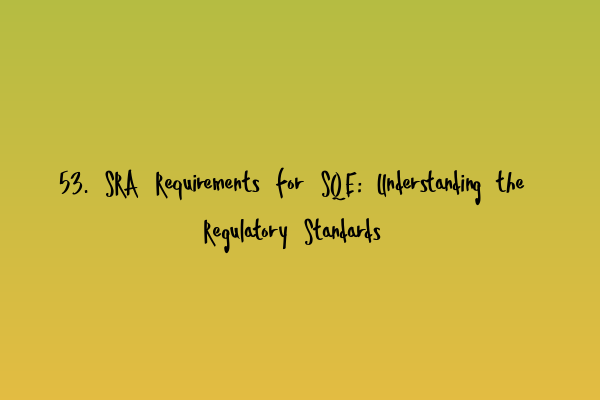53. SRA Requirements for SQE: Understanding the Regulatory Standards
When preparing for the Solicitors Qualifying Exam (SQE), it is crucial to familiarize yourself with the regulatory standards set by the Solicitors Regulation Authority (SRA). Understanding these requirements is not only essential for successfully passing the exam but also for practicing as a qualified solicitor in England and Wales. In this article, we will delve into the SRA requirements for the SQE and discuss how to navigate them effectively.
The SQE: A New Pathway to Qualification
The SQE has replaced the previous qualification route, the Legal Practice Course (LPC), and aims to provide a more standardized assessment of aspiring solicitors’ skills and knowledge. The SRA has designed the SQE to test candidates’ competence in both practical and legal areas, ensuring they have the necessary skills to practice as solicitors.
As with any professional qualification, the regulatory standards play a vital role in shaping the structure and content of the SQE. Here, we will outline the key SRA requirements that every prospective candidate should be aware of.
1. SQE1: Assessing Legal Knowledge and Application
SQE1 focuses on testing candidates’ legal knowledge and application. It comprises two parts: functioning legal knowledge and practical legal skills.
Functioning legal knowledge assesses candidates’ understanding of legal concepts, principles, and rules across various areas of law. It checks their ability to apply legal knowledge to practical scenarios and demonstrate competence in legal research, analysis, and problem-solving.
Practical legal skills evaluate candidates’ ability to perform legal tasks, such as drafting legal documents, writing advice letters, and conducting client interviews. It emphasizes the application of legal knowledge in practical settings, mirroring the demands of real-life legal practice.
To prepare for SQE1, candidates must invest considerable time in studying the core areas of law, practicing sample papers, and honing their legal research and writing skills. SQE Sample Papers can be invaluable tools for gaining familiarity with the exam format and perfecting exam techniques.
2. SQE2: Assessing Practical Legal Skills
SQE2 is focused on assessing candidates’ practical legal skills, including client interviewing, advocacy, legal drafting, and case analysis. This stage of the exam ensures that candidates are equipped with the necessary skills to handle real-life legal scenarios effectively.
Preparing for SQE2 requires extensive practice and refinement of practical legal skills. Candidates should utilize resources that offer guidance and practice opportunities in areas such as client interviewing techniques, persuasive advocacy, and writing effective legal documents.
Understanding the focus areas in SQE1 and SQE2 is crucial for tailoring your preparation strategy effectively. By identifying your strengths and weaknesses, you can allocate your study time accordingly and increase your chances of success in the exam.
3. Ethics and Professional Conduct
In addition to the legal skills assessments, the SQE also includes an evaluation of candidates’ understanding of ethics and professional conduct. Aspiring solicitors must demonstrate a thorough grasp of the SRA Code of Conduct, which outlines the ethical standards expected of legal professionals.
Mastering the principles of ethics and professional conduct is essential not only for the exam but also for building a successful career as a solicitor. It is advisable to familiarize yourself with the code early on and regularly review its provisions to ensure you remain up to date with the regulatory standards.
4. Preparing for the Exam
Preparing for the SQE requires a strategic approach that incorporates comprehensive study, practical skills development, and continuous evaluation of your progress. It is essential to adapt your study strategy based on your performance in mock exams and debrief sessions, as this feedback can highlight areas that require further focus.
Incorporating regular practice with SQE sample papers and simulated scenarios can help familiarize yourself with the exam format and improve your time management and problem-solving skills. Consistent practice with authentic exam-like questions can elevate your scores and build your confidence for the actual exam day.
Conclusion
Aspiring solicitors must familiarize themselves with the SRA requirements for the SQE to effectively prepare for the exam and meet the regulatory standards for qualification. By understanding the key areas of assessment, such as legal knowledge, practical skills, and ethical conduct, candidates can tailor their study approach and increase their chances of success.
Remember, the SQE is not just an exam but a gateway to your career as a solicitor. By investing time and effort into your preparation, practicing with SQE sample papers, and seeking guidance where needed, you can pave the way for a successful journey towards becoming a qualified solicitor in England and Wales.
